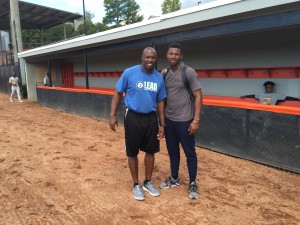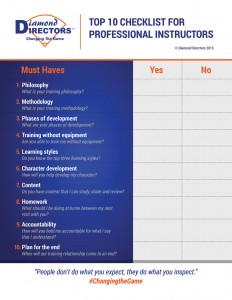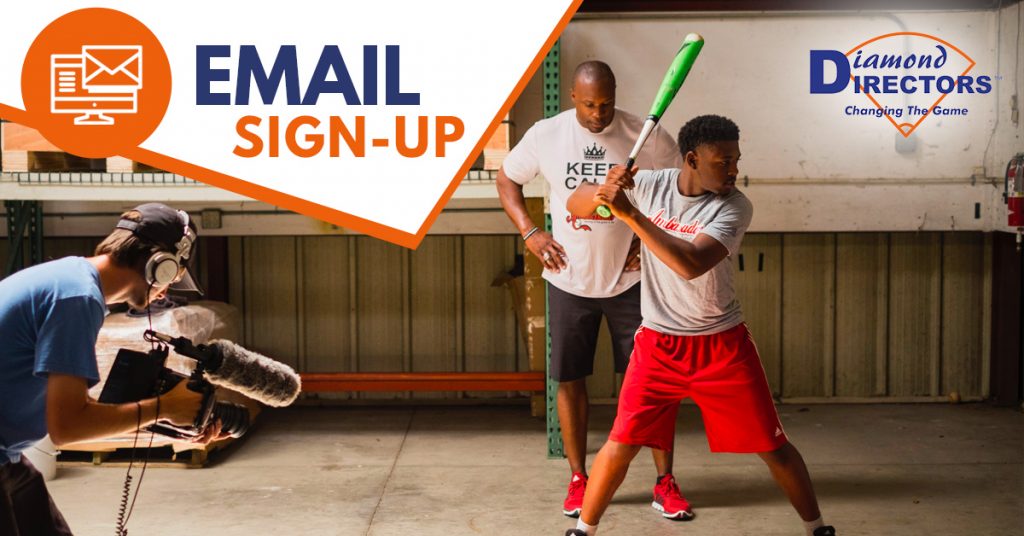My experiences that include failures and successes as a professional baseball swing coach feed my ego. My conviction as being self-centered and egotistical holds me accountable for sharing what I know with others.
My love for baseball and my assignment from God to empower others through baseball makes me fight for the integrity of the professional baseball swing coaches industry.

I advise you to read two of my earlier blogs on this topic – “10 Things Every Hitting Instructor Must do to Serve His Clients” and “Why the Professional Baseball Swing Coach Industry Must Change – Now.” These should help you make sense of the contributions that are expected from me and my peers.
With regards to the “Top 10 Checklist for Professional Baseball Instructors,” I asked some of my peers and clients questions to look it over, and then answer some questions about what they had read. Some agreed with me and some disagreed. My only expectation was that they participate.
It not who’s right – it’s what’s right. I don’t do everything right, but I do have opinions based on my experiences – successful or not. When having conversations with others about baseball philosophy, methodologies, etc., I govern myself by the following three rules:
- Rule #1 – State your opinions around people who are more intelligent than you, even if they don’t coach a sport that you trust, so that your opinions can change to reflect theirs when necessary and without hesitancy.
- Rule #2 – Never question someone with regards to what they say. Always question them on why they said it, so that you can learn what you need to learn from them and do what you need to do to serve others.
- Rule #3 – This is from the “Rotary 4-Way Test,” which asks, “Is it the truth? Is is fair to all concerned? Will it build goodwill and better friendships? Will it be beneficial to all concerned?”
Following is my Q&A with some of my peers and clients:
Derek Simmons, assistant coach at Kennesaw State University
Should professional hitting instructors have a training philosophy?
I believe all professional instructors should have a training philosophy. What we use at Kennesaw State is visualization. I feel that my hitters must see themselves being success before it happens, so that we have focal points and a routine, even if we are hitting off the tee. This prepares us for what we will do in games. Relaxing the mind will relax the body, and allow your physical ability to act naturally.
Scott Prigge, senior VP for National Property Operations (Atlanta)
(Parent of Diamond Directors’ student Ellis Prigge)
Should professional hitting instructors have a training philosophy?
Hitting instructors absolutely need a philosophy to be considered a legitimate profession. Just like golf and tennis have evolved to certify instructors, baseball needs to do the same. By asking these types of questions (from the “Top 10 Checklist”), you are proactively setting the expectations for students. Today, typical baseball students are not asking about an instructor’s philosophy, certification or even discussing expectations. Baseball lessons are no less expensive than golf or tennis, so why shouldn’t students have the same expectations? By asking difficult questions, you are setting yourself apart from the pack and putting yourself in a desirable position to be viewed as “the” leader in baseball. It is also extremely beneficial to the students themselves, as they will now get quality instruction. This will keep them interested and excited to stay involved.
Zack Phillips, professional instructor at D-BAT Buckhead (Atlanta)
Should professional hitting instructors have a training philosophy?
Yes, I believe it is very important to have a hitting philosophy for our clients. Without one, I feel like our relationships would be stagnate. I do not believe we would entirely be helping our clients without a philosophy. It is important, that as instructors, we fulfill the duties we said we would for our clients and their parents. I believe it is important to set goals for ourselves and our clients. This makes it possible to maximize what we’re trying to accomplish, which is to build elite hitters. Having a philosophy helps show the clients and their parents what needs to be accomplished and how we do it.
Ellis Prigge, Diamond Directors Client and member of Buckhead Baseball (Atlanta)
(2015 USA Baseball Trials participant)
Should professional hitting instructors have a training methodology?
Hitting instructors are not only teachers but mentors, too. When a client commits to a coach, most of the time, they are expected to help them become a better player and person. I believe that if the player gives the coach his trust and effort, the coach should have a goal or plan of what he wants the player to become in the end. There must be a commitment from both sides. The coach must have the knowledge and ability to get it done. Sometimes, it’s nice to have a trusting and fun relationship, like I do with my coach.
Kyle Lewis, Diamond Directors Client and student/athlete at Mercer University (Atlanta)
(2015 Southern Conference Player of the Year)
(2015 Cape Cod Summer League All-Star)
(2016 MLB Draft Prospect)
Should professional hitting instructors train hitters based on phases of development?
Yes, I think this is important, because you cannot move too quickly with them. In order to get to stages of consistency and repetition, you must first pull back and address the individual player’s strengths and weaknesses. Then, you can focus on fixing those specific weaknesses before working on the total package.
Kory Warren, professional instructor at D-Bat Buckhead (Atlanta)
Should professional instructors be able to train hitters without equipment?
At some point, a hitter does have to actually use a bat to hit a ball, but there can and really should be hours of repetition that don’t require any equipment other than a hitter’s mind and body. Working without the immediate feedback of a good or bad hit can force the hitter to rely on repeating the muscle movements learned during training, instead of over adjusting trying to just hit one hard. This allows the hitter to focus more on the process of the swing, rather than to just focus on the result, which will help the hitter better learn to repeat the swing.
Nick Longhi, Boston Red Sox Minor League Prospect
Should professional hitting instructors have a basic understanding of learning styles in order to effectively teach hitters?
Yes, I think it’s very important to learn the styles of different headers, because no two hitters swing the same. It is important to make sure that no matter the stance, load, leg kick or whatever, when they are ready to hit, they have to be in a good consistent hitting point every time. It’s also important to teach the same philosophy and mental approach to hitting for consistency.
Kerwin Giles, D-Bat Buckhead, Professional Instructor
Should professional hitting instructors be responsible for helping with the development of character of their hitters?
I believe character can and should be taught at all times – whether the young person is a client or not. Baseball is a true game of character. A long time ago, my father explained to me that it takes a special person to play the game, in part, because the game is slow. Baseball is both an individual and team sport. Learning how to work with others is a skill that can be taught over a period of time. And you need it to be successful. Character comes in many ways.
Baseball can expose a lot of your character flaws at certain times. For instance, being humble is a character trait that should continually be performed. The ability to do things on your own is also an important character trait. Every player must be able to work on his own. This is important, because as an instructor, you don’t want the player stuck in a certain place any longer than he should be. Some clients may need more help with character than others, but I believe all of them need it in some form.
Callix Crabbe, former Major League Baseball player with the San Diego Padres and owner of Crabbe-ology Sports Development (Tampa, Fla.)
Should professional hitting instructors be responsible for helping with the development of character of their hitters?
Yes. A very important concept associated with offensive production is “proper mindset.” After a hitter is assessed for all three components – mental, technical and physical – a plan for enhancement can be built. In many cases, getting into the minds and hearts of the hitter is the “gateway” to improvement. If a player is trying to be someone or something he isn’t, there will be no improvement.
The definition of character is “the quality of being individual, typically in an interesting or unusual way.” If a hitter can walk up to home plate trusting his individual traits, he will be successful offensively.
Should professional hitting instructors be held responsible for creating content on a frequent basis that their clients can study, review and share?
Yes. What makes a great hitting instructor isn’t only his understanding of swing mechanics or swing thoughts. It’s his ability to communicate a message clearly to the many individuals whose success he’s responsible for. New and fresh content can “connect the dots” on different days and gives that player the ability to teach others which, ultimately, will teach themselves.
Should professional hitting instructors be able to map out a development plan with a specific end date like a physical therapist would for players coming off an injury?
No. I believe a plan with an end date is a great concept, but much like a physical therapist, a patient could very well have setbacks. This ultimately changes the effective end date of rehab. Getting hitters to “trust” at a high percentage varies based on other factors we can’t always control, but must be found out. Those factors can include parents, emotional issues, school matters, self-doubt, etc.
Lincoln Martin, former professional infielder with the Baltimore Orioles, and current Major League Baseball Scout for the Florida Marlins; also owns Top Tier Sports (Douglasville, Ga.)
Should professional hitting instructors be held responsible for creating content on a frequent basis that their clients can study, review and share?
Hitting instructors should be held accountable to share content. I feel it helps to create a learning environment for the students. It also forces the kids to become students of the game, as well as increase their aptitude to learn.
Ed Hartwell, former Assistant Scouting Director with the Arizona Diamondbacks (1995-1998)
Should professional hitting instructors be responsible for providing specific homework for their clients after practice?
First, I think this is a great basis for which any coach/instructor can begin or enhance his own model or strategy in becoming a good instructor and coach. That being said, not all students require the same thing from each individual coach, and not every instructor has the same abilities and capabilities to transfer information from each category to his students. I would take it a step further and say the whole discipline he has outlined needs to be evaluated and tailored for both student and instructor/coach.
Tip of the Week: Why good leaders make you feel safe – Simon Sinek
John Flading, president of Swingaway Sports Products
Should professional hitting instructors be responsible for providing specific homework for their clients after practice?
Professional hitting instructors and coaches are judged, just like any other profession, by results. With that in mind, if a hitting instructor does not generate positive and visible results in a specified time frame, he will be replaced, Period. Instructors must be able to quickly and accurately evaluate the hitter, identify any swing flaws, and then implement a plan and program to correct the swing.
Most swing flaws have been created over time through Negative Muscle Memory, therefore it will take time, combined with repetition, to break the negative habit and create “Positive Muscle Memory”
Working with that hitter in lessons is only part of the solution. The hitter must be able to have drills that he can perform away from lessons. This “homework” will give him the repetitions he needs to reinforce the new swing techniques. This will accelerate the hitter’s progress and get the results faster, so that he can continue to work with the instructor.
Jimmy Rider, assistant coach at the University of Georgia
Should professional hitting instructors be held accountable for what’s being taught and hold their clients accountable for what’s being learned?
Hitting instructors must be held accountable for what they teach, because the hitting methodologies and techniques become the brand that helps their clients succeed. This brand will be the building blocks to whether or not their players can develop into a successful hitters in the future. However, the client also needs to be held responsible for what he has learned. If the client is not held responsible for new techniques he has learned, he will continue to incorporate bad habits into his swing/approach and will not progress into the type of hitter he wants to be.
Bobby Scales, director of player development with the Los Angeles Angels
Should professional hitting instructors be held accountable for what’s being taught and hold their clients accountable for what’s being learned?
Coaches must be held accountable for the information they teach. Teachers on any level have to posses a solid knowledge base, have the ability to connect with their students, and be able to pass the information on to students of different ages and ability levels. Whether you are a hitting coach, high school math teacher or violin instructor, at the end of the day, your students/players are your report card.
At the end of a given period of time, do your students understand the process? If your students understand the process and have enough physical ability to execute the skill, the results will improve. Conversely, students/players are just as responsible to do all they can to acquire the knowledge. Students’ aptitude and physical ability are what they are. It is incumbent upon them to meet the instructor half way on the path to learning. In the end, being accountable means standing by your work and efforts. It is essential that both sides understand this and be held to that standard.
Michael Brady, varsity baseball program director for The Walker School (Atlanta)
(Middle School Head Football Coach)
(Physical Education Teacher)
Should professional hitting instructors be able to map out a development plan with a specific end date like a physical therapist would for players coming off an injury?
I believe that a professional hitting instructor should be able to do this. Professional hitting instructors invest the time to keep their skills and teaching current with a philosophy, just like doctors or therapists. They need to have the knowledge of swing mechanics, deficiencies, corrective drill work and be able to communicate effectively with the player to correct those deficiencies.
By further knowing the body’s muscular movements, a player’s visual acuity, his mental makeup and toughness, a player can be taught the most productive swing his body will allow. There may be speed bumps along the way, but a very encouraging instructor can work those kinks out even if the timetable needs to be modified for that players perfected swing.
Rendell Jackson, assistant director of athletics at Atlanta Public Schools
(Parent of Diamond Directors’ client Myles Jackson)
Should professional hitting instructors be able to map out a development plan with a specific end date like a physical therapist would for players coming off an injury?
Great leaders are always taught that they should begin and plan with the end in mind. Doctors provide prescriptions for patience with the goal of a cure in mind. Physical therapists plan steps with the goal of optimum performance and health in mind. As such, I believe that professional hitting coaches should be required to provide a deliberate and specific plan regarding the development process for their hitters. Every building process begins with a good foundation, and has specific steps that must be followed to achieve the best product. This process also provides the opportunity to back track if they find themselves off course. Providing a development map is the plan to optimal performance and should not be a secret to the hitter being developed. If you can provide a plan, how do I know where you are taking me – and better yet, how do I know if you have any idea where we are going?
For more information, visit www.diamonddirectors.com today. Check out our Digital Magazine.
BIO
C.J. Stewart has built a reputation as one of the leading professional hitting instructors in the country. He is a former professional baseball player in the Chicago Cubs organization and has also served as an area scout for the Cincinnati Reds. As founder and CEO of Diamond Directors Player Development, CJ has more than 12 years of player development experience and has built an impressive list of clients, including some of the top young prospects in baseball today. If your desire is to change your game for the better, C.J Stewart has a proven system of development and track record of success that can work for you.


Leave a Reply